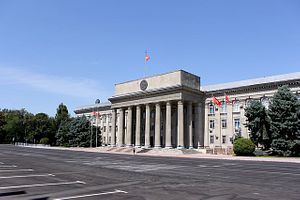A week after being fired, former Kyrgyz Prime Minister Sapar Isakov says he has been questioned by investigators about the modernization of a power plant that failed in late January in the Kyrgyz capital, Bishkek. On Thursday, Isakov posted a photo of the summons on his Facebook. Eurasianet reported that a spokesman for the State Committee for National Security confirmed that Isakov was being questioned as a witness in the investigation into how the contract to modernize the power plant was awarded.
In late January as a cold snap enveloped Bishkek — pushing temperatures to a low of minus 16 Fahrenheit and a high of only 5 F — the capital’s thermal power plant began malfunctioning. Public anger almost immediately took aim at the Chinese company that had modernized the plant. The Chinese company, Tebian Electric Apparatus Stock Co. Ltd. (TBEA), was granted the contract for $386 million, with work beginning in 2014 and concluding in August 2017.
As I noted in January, the power plant project has come under criticism before:
In early 2014, just after the Kyrgyz parliament ratified the loan agreement, 24.kg published a lengthy op-ed which called the modernization a “gross mistake” and claimed that the ratification came under pressure from the government. The article called into question the procurement process and noted that other (Chinese) companies, with lower bids, had been bypassed and TBEA selected without a public tender…
The article makes the case that the Chinese company successfully lobbied Kyrgyz politicians to land the contract.
Nurjamal Djanibekova, writing for Eurasianet, noted a 2015 Chamber of Audits report citing irregularities in the project, notably the lack of a tender, lack of a feasibility study and inflated costs.
The main difference between 2015 and 2018 is that Almazbek Atambayev is no longer president. While increased scrutiny on the project stems directly from the January failure, there’s a degree of politics at play here as well.
In the grand tradition of Kyrgyz parliamentary politics, Isakov hadn’t been prime minister all that long (Kyrgyzstan has had almost as many prime ministers as years of independence). Isakov was approved in an overwhelming vote — 97 of 102 lawmakers present (the body has 120 members) in favor — on August 25, 2017. The next day, then-President Atambayev formally released him from his position as the president’s chief of staff so he could take the prime ministership left open by the resignation of Sooronbay Jeenbekov. Jeenbekov resigned to run for the presidency, which he won in the October 15 election with Atambayev’s full support.
On August 30, Atambayev cut the ribbon at a ceremony marking the finish of modernization work at the Bishkek power plant.
Both the power plant and the Atambayev-Jeenbekov relationship began malfunctioning a few months later.
Jeenbekov recently dismissed two top security officials viewed as close to former President Atambayev, in addition to several other firings and reshuffles of Atambayev appointees. Last week, opposition lawmakers initiated a confidence vote. The ruling coalition, led by the Social Democratic party — which selected Atambayev as its head at its recent congress — withdrew support for Isakov. An overwhelming majority voted for the no-confidence motion. Hours later, Jeenbekov dismissed the Isakov government.
Mukhammetkaly Abylgaziev, first deputy head of the Presidential Administration, was selected to replace Isakov and on April 25 he and the new Kyrgyz government were sworn in. Of the new government, Djanibekova wrote, “The names at the top might have changed, but the faces are anything but fresh. Almost all are long-time civil service veterans and Jeenbekov loyalists.”
And this brings us back to the power plant. There very well may have been some funny business going on; indeed, a project of that scale without a tender process is a red flag for corruption. That said, it’s significant that the issue is only being pursued seriously after there was a major failure, after Atambayev left office, and after his appointees have been shuffled out as well.
The loan agreement to modernize the plant was signed in 2013 during Chinese President Xi Jinping’s Central Asia tour. It was on that trip through Eurasia that Xi unveiled what is now called the Belt and Road Initiative (BRI). During his stop in Bishkek, Xi and Atambayev upgraded the China-Kyrgyzstan relationship to that of a “strategic partnership.” How far the Kyrgyz inquiry goes could impact the appetite in China to take up Kyrgyz projects, but it seems unlikely that Bishkek will push that hard on Beijing — the former administration, however, is a much easier target.
































